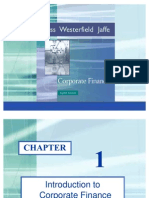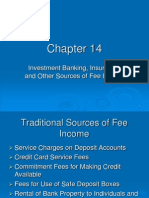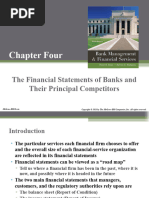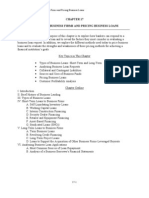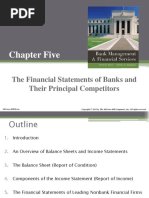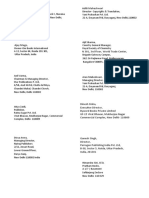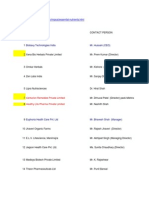Ross 7 e CH 27
Ross 7 e CH 27
Uploaded by
Meddy YogastoroCopyright:
Available Formats
Ross 7 e CH 27
Ross 7 e CH 27
Uploaded by
Meddy YogastoroOriginal Title
Copyright
Available Formats
Share this document
Did you find this document useful?
Is this content inappropriate?
Copyright:
Available Formats
Ross 7 e CH 27
Ross 7 e CH 27
Uploaded by
Meddy YogastoroCopyright:
Available Formats
27-0
CHAPTER
27
2005 The McGraw-Hill Companies, Inc. All Rights Reserved.
Cash Management
McGraw-Hill/Irwin Corporate Finance, 7/e
27-1
Chapter Outline
27.1 Reasons for Holding Cash 27.2 Determining the Target Cash Balance 27.3 Managing the Collection and Disbursement of Cash 27.4 Investing Idle Cash 27.5 Summary & Conclusions
McGraw-Hill/Irwin Corporate Finance, 7/e
2005 The McGraw-Hill Companies, Inc. All Rights Reserved.
27-2
27.1 Reasons for Holding Cash
Transactions motive Compensating balances
McGraw-Hill/Irwin Corporate Finance, 7/e
2005 The McGraw-Hill Companies, Inc. All Rights Reserved.
27-3
27.2 Determining the Target Cash Balance
The Baumol Model The Miller-Orr Model Other Factors Influencing the Target Cash Balance
McGraw-Hill/Irwin Corporate Finance, 7/e
2005 The McGraw-Hill Companies, Inc. All Rights Reserved.
27-4
Costs of Holding Cash
Costs in dollars of holding cash
Trading costs increase when the firm must sell securities to meet cash needs.
Total cost of holding cash
Opportunity Costs The investment income foregone when holding cash.
Trading costs C*
McGraw-Hill/Irwin Corporate Finance, 7/e
Size of cash balance
2005 The McGraw-Hill Companies, Inc. All Rights Reserved.
27-5
The Baumol Model
F = The fixed cost of selling securities to raise cash T = The total amount of new cash needed K = The opportunity cost of holding cash, a.k.a. the interest rate.
C
C 2
If we start with $C, spend at a constant rate each period and replace our cash with $C when we run out of cash, our average cash balance will be C . 2 The opportunity cost C C of holding is K 2 2
1
McGraw-Hill/Irwin Corporate Finance, 7/e
Time
2005 The McGraw-Hill Companies, Inc. All Rights Reserved.
27-6
The Baumol Model
F = The fixed cost of selling securities to raise cash T = The total amount of new cash needed K = The opportunity cost of holding cash, a.k.a. the interest rate.
C
C 2
As we transfer $C each period we incur a trading cost of F each period. If we need $T in total over the planning period we will T pay $F times. C T Time The trading cost is F C
2005 The McGraw-Hill Companies, Inc. All Rights Reserved.
1
McGraw-Hill/Irwin Corporate Finance, 7/e
27-7
The Baumol Model
C T Total cost K F 2 C
C K Opportunity Costs 2
Trading costs T F
C* Size of cash balance The optimal cash balance is found where the opportunity costs equals the trading costs
McGraw-Hill/Irwin Corporate Finance, 7/e
C*
2T F K
2005 The McGraw-Hill Companies, Inc. All Rights Reserved.
27-8
The Baumol Model
The optimal cash balance is found where the opportunity costs equals the trading costs Opportunity Costs = Trading Costs
C T K F 2 C
Multiply both sides by C
C K T F 2
T F C 2 K
2
2TF C K
*
2005 The McGraw-Hill Companies, Inc. All Rights Reserved.
McGraw-Hill/Irwin Corporate Finance, 7/e
27-9
The Miller-Orr Model
The firm allows its cash balance to wander randomly between upper and lower control limits. $ When the cash balance reaches the upper control limit H cash
is invested elsewhere to get us to the target cash balance Z.
H
When the cash balance reaches the lower control limit, L, investments are sold Z to raise cash to get us up to the target cash balance. L
Time
McGraw-Hill/Irwin Corporate Finance, 7/e 2005 The McGraw-Hill Companies, Inc. All Rights Reserved.
27-10
The Miller-Orr Model Math
Given L, which is set by the firm, the Miller-Orr model solves for Z and H
* *
H 3Z 2L 3F 2 Z* 3 L 4K where s2 is the variance of net daily cash flows. The average cash balance in the Miller-Orr model is 4Z * L Average cash balance 3
2005 The McGraw-Hill Companies, Inc. All Rights Reserved.
McGraw-Hill/Irwin Corporate Finance, 7/e
27-11
Implications of the Miller-Orr Model
To use the Miller-Orr model, the manager must do four things:
1. Set the lower control limit for the cash balance.
2. Estimate the standard deviation of daily cash flows.
3. Determine the interest rate. 4. Estimate the trading costs of buying and selling
securities.
McGraw-Hill/Irwin Corporate Finance, 7/e
2005 The McGraw-Hill Companies, Inc. All Rights Reserved.
27-12
Implications of the Miller-Orr Model
The model clarifies the issues of cash management:
The best return point, Z, is positively related to trading costs, F, and negatively related to the interest rate K. Z and the average cash balance are positively related to the variability of cash flows.
McGraw-Hill/Irwin Corporate Finance, 7/e
2005 The McGraw-Hill Companies, Inc. All Rights Reserved.
27-13
Other Factors Influencing the Target Cash Balance
Borrowing
Borrowing is likely to be more expensive than selling marketable securities. The need to borrow will depend on managements desire to hold low cash balances.
McGraw-Hill/Irwin Corporate Finance, 7/e
2005 The McGraw-Hill Companies, Inc. All Rights Reserved.
27-14
Other Factors Influencing the Target Cash Balance
Compensating Balance
Firms have cash in the bank as a compensation for banking services. Large corporations have thousands of accounts with several dozen bankssometimes it makes more sense to leave cash alone than to manage each account on a daily basis.
McGraw-Hill/Irwin Corporate Finance, 7/e
2005 The McGraw-Hill Companies, Inc. All Rights Reserved.
27-15
Float
The difference between bank cash and book cash is called float. Float management involves controlling the collection and disbursement of cash.
McGraw-Hill/Irwin Corporate Finance, 7/e
2005 The McGraw-Hill Companies, Inc. All Rights Reserved.
27-16
27.3 Managing the Collection and Disbursement of Cash
Accelerating Collections Delaying Disbursements Disbursement Float Zero-Balance Accounts Drafts Ethical and Legal Questions
McGraw-Hill/Irwin Corporate Finance, 7/e
2005 The McGraw-Hill Companies, Inc. All Rights Reserved.
27-17
Accelerating Collections
Customer mails payment Company receives payment Company deposits payment Cash received
time
Mail delay Processing delay Clearing delay
Mail float
Processing float
Clearing float
Collection float
McGraw-Hill/Irwin Corporate Finance, 7/e 2005 The McGraw-Hill Companies, Inc. All Rights Reserved.
27-18
Overview of Lockbox Processing
Corporate Customers Corporate Customers Corporate Customers Corporate Customers
Post Office Box 1
Local Bank Collects funds from PO Boxes Envelopes opened; separation of checks and receipts
Post Office Box 2
Details of receivables go to firm
Deposit of checks into bank accounts
Firm processes receivables
McGraw-Hill/Irwin Corporate Finance, 7/e
Bank clears checks
2005 The McGraw-Hill Companies, Inc. All Rights Reserved.
27-19
Delaying Disbursements
Firm prepares check to supplier Post Office processing
1. Write check on a distant bank. 2. Hold payment for several days after
Delivery of check to supplier
Deposit goes to suppliers bank
postmarked in office. 3. Call supplier firm to verify statement accuracy for large amounts. 4. Mail from distant post office. 5. Mail from post office that requires a great deal of handling.
2005 The McGraw-Hill Companies, Inc. All Rights Reserved.
Bank collects funds
McGraw-Hill/Irwin Corporate Finance, 7/e
27-20
Drafts
Firms sometimes use drafts instead of checks. Drafts differ from checks because they are not drawn on a bank but on an issuer (the firm) and are payable by the issuer. The bank acts only as an agent, presenting the draft to the issuer for payment. When the draft is transmitted to a firms bank for collection, the bank must present the draft to the issuing firm for acceptance before making payment. After the draft has been accepted, the firm must deposit the necessary cash to cover the payments. This allows the firm to keep less cash on hand.
McGraw-Hill/Irwin Corporate Finance, 7/e
2005 The McGraw-Hill Companies, Inc. All Rights Reserved.
27-21
Ethical and Legal Questions
The financial managers must always work with collected company cash balances and not with the companys book balance, which reflects checks that have been deposited but not collected. If you are borrowing the banks money without their knowledge, you are raising serious ethical and legal questions.
McGraw-Hill/Irwin Corporate Finance, 7/e 2005 The McGraw-Hill Companies, Inc. All Rights Reserved.
27-22
27.4 Investing Idle Cash
A firm with surplus cash can park it in the money market.
Some large firms and many small ones use money market mutual funds.
Firms have surplus cash for three reasons:
Seasonal or Cyclical Activities Planned Expenditures Different Types of Money Market Securities
McGraw-Hill/Irwin Corporate Finance, 7/e 2005 The McGraw-Hill Companies, Inc. All Rights Reserved.
27-23
Seasonal Cash Demands
Total Financing needs Bank loans Marketable securities Short-term financing
Long-term financing J
McGraw-Hill/Irwin Corporate Finance, 7/e
Time
2005 The McGraw-Hill Companies, Inc. All Rights Reserved.
27-24
27.5 Summary & Conclusions
A firm holds cash to conduct transactions and to compensate banks for the various services they render. The optimal amount of cash for a firm to hold depends on the opportunity cost of holding cash and the uncertainty of future cash inflows and outflows.
McGraw-Hill/Irwin Corporate Finance, 7/e
2005 The McGraw-Hill Companies, Inc. All Rights Reserved.
27-25
27.5 Summary & Conclusions
Two transactions models that provide rough guidelines for determining the optimal cash postion are:
The Miller-Orr model The Baumol model
McGraw-Hill/Irwin Corporate Finance, 7/e
2005 The McGraw-Hill Companies, Inc. All Rights Reserved.
27-26
27.5 Summary & Conclusions
The firm can make use of a variety of procedures to manage the collection and disbursement of cash in such as way as to speed up the collection of cash and slow down payments.
McGraw-Hill/Irwin Corporate Finance, 7/e
2005 The McGraw-Hill Companies, Inc. All Rights Reserved.
27-27
27.5 Summary & Conclusions
Some methods to speed collections are
Lockboxes Concentration banking Wire transfers
The financial managers must always work with collected company cash balances and not with the companys book balance.
McGraw-Hill/Irwin Corporate Finance, 7/e
2005 The McGraw-Hill Companies, Inc. All Rights Reserved.
27-28
27.5 Summary & Conclusions
If you are borrowing the banks money without their knowledge, you are raising serious ethical and legal questions. The answers to which you probably know by now.
McGraw-Hill/Irwin Corporate Finance, 7/e
2005 The McGraw-Hill Companies, Inc. All Rights Reserved.
You might also like
- Unilever Pakistan LimitedDocument126 pagesUnilever Pakistan LimitedXohaib UQNo ratings yet
- Ross 7 e CH 01Document24 pagesRoss 7 e CH 01seshagsNo ratings yet
- Lecture-5Document37 pagesLecture-5Huy QuangNo ratings yet
- Pricing of DepositDocument20 pagesPricing of DepositMahmudur Rahman100% (3)
- Course Code and Title: ACED 7Document18 pagesCourse Code and Title: ACED 7maelyn calindongNo ratings yet
- Chapter 14Document20 pagesChapter 14runawayyyNo ratings yet
- Chap 017Document40 pagesChap 017anhnguyen.31221025207No ratings yet
- Mergers and Acquisitions: Mcgraw-Hill/Irwin Corporate Finance, 7/EDocument13 pagesMergers and Acquisitions: Mcgraw-Hill/Irwin Corporate Finance, 7/EKrishna KumarNo ratings yet
- Class 1 NotesDocument57 pagesClass 1 Notesbenny1011No ratings yet
- Session 3 - Financial Statements of BanksDocument34 pagesSession 3 - Financial Statements of Banksvasuraj002No ratings yet
- SM ch05Document41 pagesSM ch05Akash JainNo ratings yet
- Chapter 17 (Lending To Business Firms and Pricing Business Loans)Document40 pagesChapter 17 (Lending To Business Firms and Pricing Business Loans)IbnuIqbalHasan67% (6)
- Corporate Finance: Cash ManagementDocument29 pagesCorporate Finance: Cash ManagementrubalNo ratings yet
- Dividends and Other Payouts: Mcgraw-Hill/Irwin Corporate Finance, 7/EDocument33 pagesDividends and Other Payouts: Mcgraw-Hill/Irwin Corporate Finance, 7/Eফিরোজ হোসেনNo ratings yet
- Chapter 11.liquidity and Reserve Management Strategies and PoliciesDocument33 pagesChapter 11.liquidity and Reserve Management Strategies and PoliciesYeu Waj100% (2)
- Mcgraw-Hill/Irwin Corporate Finance, 7/E: © 2005 The Mcgraw-Hill Companies, Inc. All Rights ReservedDocument39 pagesMcgraw-Hill/Irwin Corporate Finance, 7/E: © 2005 The Mcgraw-Hill Companies, Inc. All Rights ReservedSyarifah EmaNo ratings yet
- Risk, Cost of Capital, and Capital Budgeting: Mcgraw-Hill/Irwin Corporate Finance, 7/EDocument35 pagesRisk, Cost of Capital, and Capital Budgeting: Mcgraw-Hill/Irwin Corporate Finance, 7/EDishankDoshiNo ratings yet
- Accounts & Finance Notes 1Document7 pagesAccounts & Finance Notes 1yeshhudNo ratings yet
- Information For DecisionsDocument50 pagesInformation For Decisionssaeed786786No ratings yet
- Chapter Eleven: Commercial Banks: Industry OverviewDocument19 pagesChapter Eleven: Commercial Banks: Industry OverviewRaghid KassouaNo ratings yet
- Chapter Five: The Financial Statements of Banks and Their Principal CompetitorsDocument39 pagesChapter Five: The Financial Statements of Banks and Their Principal Competitorscynthiaaa sNo ratings yet
- IGCSE Business Studies Essential Book Answers For Unit 5Document6 pagesIGCSE Business Studies Essential Book Answers For Unit 5emonimtiazNo ratings yet
- Lecture 2Document48 pagesLecture 2samvanh2710No ratings yet
- Financial Management NotesDocument28 pagesFinancial Management Notessnehaapriya19No ratings yet
- Buying and Selling Securities: Fundamentals InvestmentsDocument47 pagesBuying and Selling Securities: Fundamentals InvestmentsarifulseuNo ratings yet
- Introduction To Corporate FinanceDocument29 pagesIntroduction To Corporate FinanceRifki AyyashNo ratings yet
- Short-Term Finance and Planning: © 2003 The Mcgraw-Hill Companies, Inc. All Rights ReservedDocument59 pagesShort-Term Finance and Planning: © 2003 The Mcgraw-Hill Companies, Inc. All Rights ReservedKARISHMAATNo ratings yet
- Chapter 12Document28 pagesChapter 12Aditi SenNo ratings yet
- BM Unit 3.1 Sources of FinanceDocument114 pagesBM Unit 3.1 Sources of Finance7229 VivekNo ratings yet
- HO# (4) Chapter Twelve: Managing and Pricing Deposit ServicesDocument32 pagesHO# (4) Chapter Twelve: Managing and Pricing Deposit ServicesEissa SamNo ratings yet
- Afin 209Document9 pagesAfin 209HENRY MAYAMBUNo ratings yet
- The Accounting Cycle: Accruals and Deferrals: Mcgraw-Hill/IrwinDocument40 pagesThe Accounting Cycle: Accruals and Deferrals: Mcgraw-Hill/IrwinjawadzaheerNo ratings yet
- CH 3 Bank Financial Statements 1 (Balance Sheet)Document41 pagesCH 3 Bank Financial Statements 1 (Balance Sheet)Sherif ElSheemyNo ratings yet
- Group 5 PresentationDocument73 pagesGroup 5 PresentationSourabh Arora100% (4)
- Corporate Finance Chapter8Document32 pagesCorporate Finance Chapter8Amit YadavNo ratings yet
- The Accounting Cycle: Accruals and DeferralsDocument51 pagesThe Accounting Cycle: Accruals and DeferralsSaira Saeed0% (1)
- Finance ReviewerDocument3 pagesFinance ReviewerRocelyn ManatadNo ratings yet
- BNK - Product CH 4 - The Financial Statements of Banks and Their Principal CompetitorsDocument38 pagesBNK - Product CH 4 - The Financial Statements of Banks and Their Principal CompetitorskataliyampilisoNo ratings yet
- CadburyDocument37 pagesCadburyjdh_apsNo ratings yet
- Final WC Repaired)Document85 pagesFinal WC Repaired)Kunal OchaniNo ratings yet
- Chapter Twelve: Managing and Pricing Deposit ServicesDocument20 pagesChapter Twelve: Managing and Pricing Deposit ServicesNgọc NguyễnNo ratings yet
- Chapter 10 1Document40 pagesChapter 10 1William Masterson Shah0% (1)
- Cash FlowDocument15 pagesCash Flowken philipsNo ratings yet
- Chuong 3Document53 pagesChuong 3Trần Khánh LinhNo ratings yet
- Essentials of Financial Statement Analysis: Revsine/Collins/Johnson/Mittelstaedt: Chapter 5Document16 pagesEssentials of Financial Statement Analysis: Revsine/Collins/Johnson/Mittelstaedt: Chapter 51220helen2000No ratings yet
- Cash ManagementDocument28 pagesCash ManagementMuendoNo ratings yet
- CMA P3 Finance 4Document23 pagesCMA P3 Finance 4Hamza Lutaf UllahNo ratings yet
- Banking Interviews Guide-2Document4 pagesBanking Interviews Guide-2SAKSHAM SINGHNo ratings yet
- CH 19 Rose8eDocument21 pagesCH 19 Rose8erunawayyyNo ratings yet
- Unit 5Document55 pagesUnit 5mundubijohn1No ratings yet
- Chapter 16 Forecasting and Managing Cash FlowDocument43 pagesChapter 16 Forecasting and Managing Cash Flowapi-358995037100% (1)
- Top 30 Investment Banking Interview Questions and AnswersDocument7 pagesTop 30 Investment Banking Interview Questions and AnswersVidit ParuthiNo ratings yet
- Working Capital Report - Finance Dept. DUDocument23 pagesWorking Capital Report - Finance Dept. DUAhmed RezaNo ratings yet
- Statement of Cash Flows: Mcgraw-Hill/IrwinDocument64 pagesStatement of Cash Flows: Mcgraw-Hill/IrwinUmm-e MughalNo ratings yet
- Chap 017Document20 pagesChap 017محمود علىNo ratings yet
- CH.2 Buying and Selling SecuritiesDocument47 pagesCH.2 Buying and Selling SecuritiesMahmood KhanNo ratings yet
- Liquidity and Reserve ManagementDocument33 pagesLiquidity and Reserve ManagementArup SahaNo ratings yet
- Chapter 5 (The Financial Statements of Banks and Their Principal Competitors)Document73 pagesChapter 5 (The Financial Statements of Banks and Their Principal Competitors)Anthony SukkarNo ratings yet
- Williams Finman 20e Chap13 AccessibilityDocument77 pagesWilliams Finman 20e Chap13 AccessibilitypotiroulisNo ratings yet
- Long Answer QuestionDocument2 pagesLong Answer Questionsinghanjay1983No ratings yet
- Summary of Howard M. Schilit, Jeremy Perler & Yoni Engelhart's Financial Shenanigans, Fourth EditionFrom EverandSummary of Howard M. Schilit, Jeremy Perler & Yoni Engelhart's Financial Shenanigans, Fourth EditionNo ratings yet
- New Final Intern ProjDocument59 pagesNew Final Intern Projtarun nemalipuriNo ratings yet
- Nidhi PrayasDocument15 pagesNidhi Prayasgautamkr15No ratings yet
- CLV Corp Law Notes 2012Document28 pagesCLV Corp Law Notes 2012Grace Robes HicbanNo ratings yet
- Raising MoneyDocument57 pagesRaising MoneysaritaNo ratings yet
- 2011-12-14 Rothstein Scott AMDocument209 pages2011-12-14 Rothstein Scott AMmatthendleyNo ratings yet
- Important QuestionsDocument17 pagesImportant QuestionsNirav GosarNo ratings yet
- Shipping Intelligence 26.novDocument20 pagesShipping Intelligence 26.novleejingsongNo ratings yet
- Comapny Resolution FormatDocument5 pagesComapny Resolution FormatSanjay GuptaNo ratings yet
- UntitledDocument4 pagesUntitledHIMANSHI SHARMANo ratings yet
- HDFC Bank LTD Repayment Schedule: Date: 10/10/2019Document3 pagesHDFC Bank LTD Repayment Schedule: Date: 10/10/2019Rn KisNo ratings yet
- Northern Trust CorporationDocument10 pagesNorthern Trust CorporationChemtrails Equals Treason100% (1)
- Pradhan Mantri MUDRA YojanaDocument3 pagesPradhan Mantri MUDRA YojanaUjjwal MishraNo ratings yet
- BCOM35Document2 pagesBCOM35Paronawala Mit'sNo ratings yet
- Introduce Airtel in SomaliaDocument23 pagesIntroduce Airtel in Somaliaramchoudhary900% (1)
- Flyers Speaking Introductory Questions PDFDocument1 pageFlyers Speaking Introductory Questions PDFGraciela PedemonteNo ratings yet
- Empanelment For Frauds Upto An Exposure of Rs 50 Crs & BelowDocument36 pagesEmpanelment For Frauds Upto An Exposure of Rs 50 Crs & BeloweveNo ratings yet
- Brand Analysis PepsodentDocument15 pagesBrand Analysis PepsodentSarthak LakhaniNo ratings yet
- Data Sheet For Nutraceuticals.Document13 pagesData Sheet For Nutraceuticals.ddeeppaakNo ratings yet
- FM Project Report On Zee EntertainmentDocument9 pagesFM Project Report On Zee EntertainmentKumar RohitNo ratings yet
- Appendix 42 - Lddap-AdaDocument1 pageAppendix 42 - Lddap-AdaRogie Apolo100% (1)
- CLRFC Final Report Chapter 3 - Final2Document16 pagesCLRFC Final Report Chapter 3 - Final2nikhilbalanNo ratings yet
- The Secret of Indigos Consistent ProfitsDocument1 pageThe Secret of Indigos Consistent Profitshimsh4u321No ratings yet
- Nomination Form: Form To A Service CentreDocument2 pagesNomination Form: Form To A Service Centrejha.sofcon5941No ratings yet
- ITM Placement BrochureDocument2 pagesITM Placement BrochureAkhtar BalbaleNo ratings yet
- Auto Debit Arrangement - 20191031 - 132926 PDFDocument3 pagesAuto Debit Arrangement - 20191031 - 132926 PDFLeonardo RoxasNo ratings yet
- Local BankDocument2 pagesLocal BankSuresh ShNo ratings yet
- Risk Committee Submittal Template Users GuideDocument32 pagesRisk Committee Submittal Template Users GuideChauhan VineetNo ratings yet
- (Splunk Case Study) (Splunk Case Study)Document16 pages(Splunk Case Study) (Splunk Case Study)LsniperNo ratings yet
- Job Arrangement Letter-FSOLDocument11 pagesJob Arrangement Letter-FSOLLouie De La TorreNo ratings yet

